Filter by

Healthcare ethics for healthcare practitioners
Healthcare ethics cannot be limited in scope to apply only to the patient but needs to apply to the healthcare practitioner as well. The relationship between the patient and the healthcare practitioner has shifted from a power relationship to a complementary relationship. Leadership, mentorship and coaching play important roles in facilitating this shift. Several themes informed this book on he…
- Edition
- -
- ISBN/ISSN
- 9781920382995
- Collation
- 150p.
- Series Title
- -
- Call Number
- 362.1068 HEA h

Chance encounters
In this rigorous and necessary book, Kristien Hens brings together bioethics and the philosophy of biology to argue that it is ethically necessary for scientific research to include a place for the philosopher. As well as ethical, their role is conceptual: they can improve the quality and coherence of scientific research by ensuring that particular concepts are used consistently and thoughtfull…
- Edition
- -
- ISBN/ISSN
- 9781800648517
- Collation
- x; 256 pg; ill.
- Series Title
- -
- Call Number
- 823.92 CHA c

Bioethics And The Holocaust
This open access book offers a framework for understanding how the Holocaust has shaped and continues to shape medical ethics, health policy, and questions related to human rights around the world. The field of bioethics continues to face questions of social and medical controversy that have their roots in the lessons of the Holocaust, such as debates over beginning-of-life and medical genetics…
- Edition
- -
- ISBN/ISSN
- 9783031019876
- Collation
- -
- Series Title
- -
- Call Number
- Public health & preventive medicine
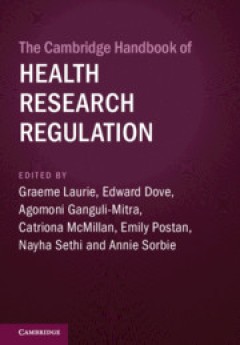
The Cambridge Handbook of Health Research Regulation
The first ever interdisciplinary handbook in the field, this vital resource offers wide-ranging analysis of health research regulation. The chapters confront gaps between documented law and research in practice, and draw on legal, ethical and social theories about what counts as robust research regulation to make recommendations for future directions. The Handbook provides an account and analys…
- Edition
- -
- ISBN/ISSN
- 9781108620024
- Collation
- xix, 444 p ; ill
- Series Title
- -
- Call Number
- 344.04196 CAM G
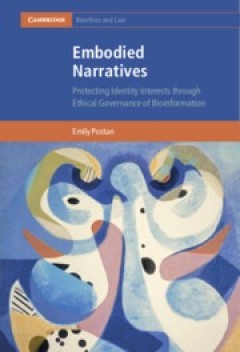
Embodied Narratives: Protecting Identity Interests through Ethical Governance…
Increasing quantities of information about our health, bodies, and biological relationships are being generated by health technologies, research, and surveillance. This escalation presents challenges to us all when it comes to deciding how to manage this information and what should be disclosed to the very people it describes. This book establishes the ethical imperative to take seriously the p…
- Edition
- -
- ISBN/ISSN
- 9781108652599
- Collation
- xiv, 316p: ill,
- Series Title
- Cambridge Bioethics and Law
- Call Number
- 610 EMI e

Bioethics across the globe : rebirthing bioethics
This open access book addresses a variety of issues relating to bioethics, in order to initiate cross-cultural dialogue. Beginning with the history, it introduces various views on bioethics, based on specific experiences from Japan. It describes how Japan has been confronted with Western bioethics and the ethical issues new to this modern age, and how it has found its foothold as it decides whe…
- Edition
- -
- ISBN/ISSN
- 9789811535727
- Collation
- xviii, 146p. : ill.
- Series Title
- -
- Call Number
- 610.1 AKA b
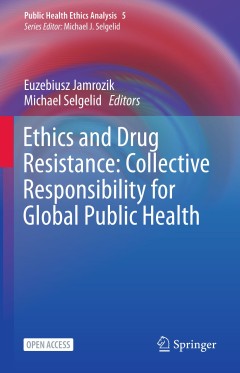
Ethics and drug resistance: collective responsibility for global public health
This Open Access volume provides in-depth analysis of the wide range of ethical issues associated with drug-resistant infectious diseases. Antimicrobial resistance (AMR) is widely recognized to be one of the greatest threats to global public health in coming decades; and it has thus become a major topic of discussion among leading bioethicists and scholars from related disciplines including eco…
- Edition
- -
- ISBN/ISSN
- 9783030278748
- Collation
- xvii, 448p. : ill.
- Series Title
- -
- Call Number
- 171.7 ETH e
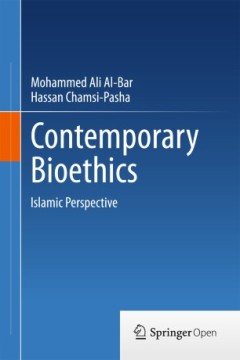
Contemporary bioethics : Islamic perspective
This book discusses the common principles of morality and ethics derived from divinely endowed intuitive reason through the creation of al-fitr' a (nature) and human intellect (al-‘aql). Biomedical topics are presented and ethical issues related to topics such as genetic testing, assisted reproduction and organ transplantation are discussed. Whereas these natural sources are God’s specia…
- Edition
- -
- ISBN/ISSN
- 9783319184289
- Collation
- xv, 267p. : ill.
- Series Title
- -
- Call Number
- 297.542 AL c
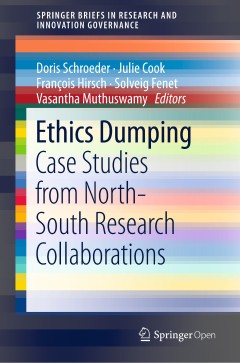
Ethics dumping : case studies from north-south research collaborations
This book provides original, up-to-date case studies of “ethics dumping” that were largely facilitated by loopholes in the ethics governance of low and middle-income countries. It is instructive even to experienced researchers since it provides a voice to vulnerable populations from the forementioned countries. Ensuring the ethical conduct of North-South collaborations in research is a proc…
- Edition
- -
- ISBN/ISSN
- 9783319647319
- Collation
- xiii, 134p. : ill.
- Series Title
- -
- Call Number
- 174.9 ETH e
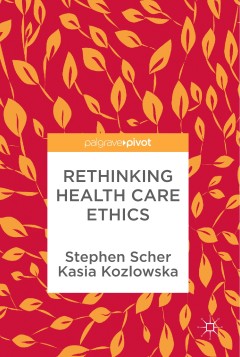
Rethinking health care ethics
The goal of this open access book is to develop an approach to clinical health care ethics that is more accessible to, and usable by, health professionals than the now-dominant approaches that focus, for example, on the application of ethical principles. The book elaborates the view that health professionals have the emotional and intellectual resources to discuss and address ethical issues …
- Edition
- -
- ISBN/ISSN
- 9789811308307
- Collation
- xv, 169p. : ill.
- Series Title
- -
- Call Number
- 171.7 SCH r
 Computer Science, Information & General Works
Computer Science, Information & General Works  Philosophy & Psychology
Philosophy & Psychology  Religion
Religion  Social Sciences
Social Sciences  Language
Language  Pure Science
Pure Science  Applied Sciences
Applied Sciences  Art & Recreation
Art & Recreation  Literature
Literature  History & Geography
History & Geography